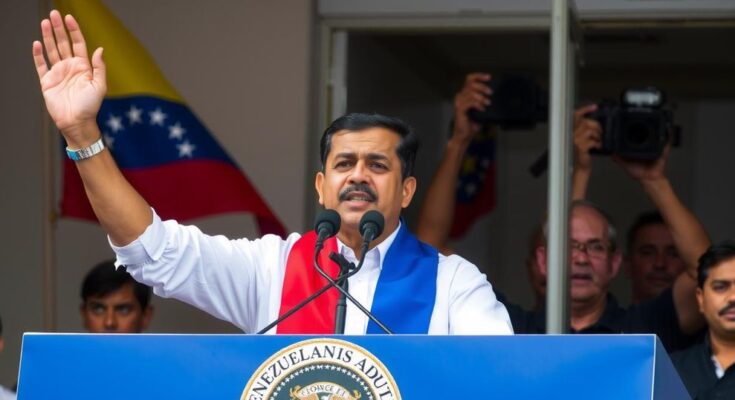Venezuela’s President Nicolas Maduro is poised to begin his third term amid protests and the detention of opposition leader Maria Corina Machado. The government’s crackdown on dissent, marked by allegations of fraud in recent elections, has drawn global condemnation, including reactions from U.S. leaders. Machado’s brief detention has intensified scrutiny on Maduro’s regime, which maintains a tight grip on power despite widespread discontent.
Venezuela’s President Nicolas Maduro, who has held power since 2013, is set to take the oath of office for a third term on Friday amidst significant dissent. This follows a global outcry and widespread protests, particularly against the backdrop of the detention of opposition leader Maria Corina Machado. Machado, who emerged from hiding to lead demonstrations in Caracas, was briefly detained by security forces following the rally, a move that sparked renewed international condemnation of Maduro’s regime and allegations of electoral fraud.
Despite the government denying her arrest, Machado’s team reported that she was intercepted by security personnel and forcibly taken. Eyewitness accounts indicated that gunfire occurred as her motorcycle was forced off the road. President-elect Donald Trump reacted by labeling Machado and Edmundo Gonzalez Urrutia—who is believed to have defeated Maduro in the disputed July 28 elections—as “freedom fighters,” asserting that their safety must be prioritized.
Internationally, various leaders and governments, including Spain and Colombia, condemned the swift repression of opposition political figures ahead of Maduro’s swearing-in. Prime Minister Giorgia Meloni of Italy characterized the ongoing situation as “another unacceptable act of repression” by the Maduro regime, further underscoring the international community’s stance against the perceived illegitimacy of Maduro’s electoral victory.
Machado delivered a courageous message to her supporters, declaring, “We are not afraid.” Conversely, Maduro’s administration maintained a hardline stance, claiming that events unfolding were part of an international conspiracy aimed at destabilizing the country, while reinforcing military presence in the streets of Caracas. Following reports of unrest and additional arrests of dissenters, the United Nations has expressed concern over widespread intimidation and arbitrary detentions.
The current crisis stems from Maduro’s assumption of power after the death of Hugo Chavez, amid a backdrop of economic collapse and the government’s extensive use of security forces to suppress opposition. Despite facing electoral disputes and international isolation, Maduro’s regime has been buoyed by support from allies such as Russia and Cuba, ensuring his political survival in the face of significant internal and external pressures.
Venezuela has undergone a severe political and economic crisis, driven by years of mismanagement and corruption under the Maduro regime, which began after Hugo Chavez’s death in 2013. Maduro’s re-election has been marred by allegations of fraud and suppression of dissent, resulting in widespread protests and international condemnation. The ongoing repression of political opposition has led to increased tensions within the country and prompted calls for a transition to democracy from both domestic and foreign stakeholders. Maduro’s support from nations such as Russia and Cuba has further complicated international efforts to challenge his rule and promote reform.
In summary, Maduro’s impending swearing-in is marred by protests and international condemnation, following the detention of prominent opposition leader Maria Corina Machado. The Venezuelan political landscape remains fraught with tension as opposition leaders continue to decry systemic repression while the Maduro administration claims to be combating an international conspiracy. The situation in Venezuela highlights the ongoing struggle for democracy amidst an oppressive regime and the necessity for sustained international advocacy for human rights and political reform.
Original Source: www.cbsnews.com




